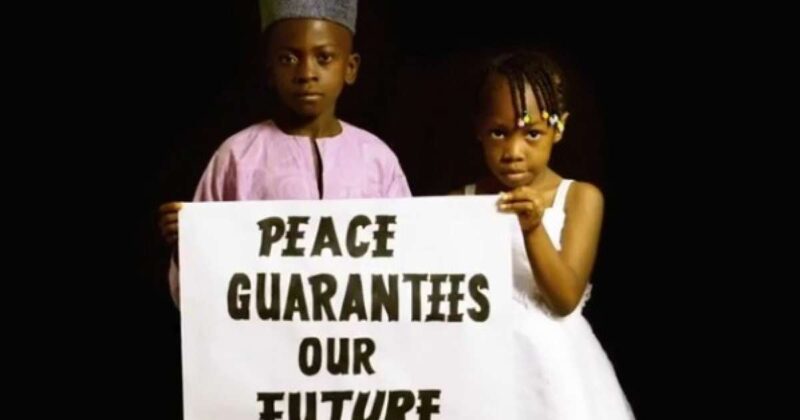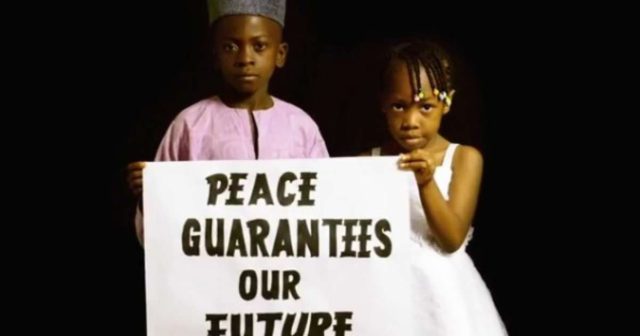Article of Faith
Peace Is A Choice -By Muhammad Muawiya Alkali and Muhammad Abubakar Nazif


Nigeria is a multi-ethnic society with unmatched cultural diversity in the African continent. Having suffered ethnic, communal and religious violence predating colonization, the country is yet to find tranquility in the face of what has surfaced as farmer-herder clashes in its rural and agro-driven communities. For a country to thrive both economically and politically there must be, to a large extent, peaceful coexistence amongst its inhabitants. Sir Winston Churchill, an inspirational leader who led Britain to victory in the Second World War once said “If the human race wishes to have a prolonged and indefinite period of material prosperity, they have got to behave in a peaceful and helpful way toward one another.” To render this claim undisputable, several studies have shown a direct correlation between peace and prosperity.
To understand the real and underlying causes of violence in our society – both remote and immediate, we must probe for the weak links in every network that supposes to do us good and not harm. These include religion with all its promise of peace; the democratic political nature that suppose to be for the people; the media, which should be neutral and unbiased; traditional rulers that should combat moral decadence in our society; as well as our ability to recognize ourselves as humans irrespective of differences from diversity.
Farmer-Herder clashes are as old as humanity itself, but why is it an issue of concern in contemporary Nigeria? The humbling answer, in many instances, points to ethnic and religious sentiments – often exploited by politicians to their advantage. Politicians, in order to achieve their whims and caprices, point one another with accusing finger in the face of preventable crisis. This can be justified when one observes critically how the ruling elite play the blame game at the expense of the lives of the common people. The opposition accuses the government of nonjudicial killings of its own people or not putting in place the needed and required security structures to subdue unreasonable killings by bandits, while the government on the other hand accuses the opposition of sponsoring violence and security sabotage across all levels.
The idea that religion is the yardstick for judging who is right or wrong has become something of a mantra. Religious leaders tend to take sides with groups or associations perpetuating crimes when such groups have connections with their faith or region. For instance, in January, 2018, the BBC aired an interview granted by Benue state’s Miyetti Allah chairman, Garus Gololo. Gololo claimed responsibility and justified the mass killings of innocent lives was a retaliation for the theft of 1000 cattle in the state. His claims invited hateful comments on the social media between individuals following the two major religions. Similarly, religious leaders and community elders from the southern states find pleasure in associating Fulani herders to a particular religion – making newspaper front pages, claiming a northern conspiracy to Islamise the country. Today, people no longer ask for the remote or immediate cause of any violence, rather they celebrate when a member of their faith assaults a member of another faith and consequently, they sympathize when a member of their faith is being assaulted.
The media`s propagation of violence by spreading hate speeches and fake news, which subsequently undermine peace and stability in our society is alarming. There is need for every act of violence to be precisely delineated by the media – call a spade a spade, give violence and its perpetrators the name they deserve. Violence of whatsoever sort should not be affiliated to any political party, religion or tribe because it knows no boundary.
In recent times, the farmer-herder clashes are more categorized as an economic crisis. One of the abundant resources Nigeria has is arable land suitable for crop cultivation. This land is not just restricted to a particular region of the country rather; each region is blessed with its own unique season which supports the growth of specific varieties or classes of crops. Knowing this to be a fact to any reasonable Nigerian, yet our media houses choose, for whatsoever reason best known to them, to refer to clashes in the states of Adamawa, Kaduna, Benue, Plateau and some parts of the southern states as “herder-farmer” while clashes in Zamfara and Sokoto are given different names. There are growing concerns to believe that it is the damage caused by some media outlets that plays an important role in escalating conflicts to violence.
Role of moral decadence in the encroaching violence cannot be over emphasized either, as it creates the ambiance for the youths to be used as tool for propagating violence. The fact that we grew up together in the same community, befriended each other and attended the same schools; share the same seats in classes irrespective of our identity – religion or tribe, that shows a level of tolerance in the face of thriving to achieve a common goal. It is much more easier to convince an uneducated person or someone that is into drugs to cause mayhem than a morally sound and educated person. Furthermore, incorporation of peace and conflict resolution as a compulsory course in our institutions as well as elimination of religious studies in our curriculum will help to enhance our ability to tolerate one another even more.
Traditional rulers have yet to grapple with the problem of communal clashes. Although, the effective roles of traditional rulers were subjugated by our colonizers, however, one of the modern functions of traditional rulers, as highlighted by Williams FS Miles, a professor of political science at the Northeastern University, Boston is; low-level conflict resolution and judicial gate-keeping. Most violence arise in rural areas where people are less informed and are deluded that fighting is the only solution to their problems – be it land dispute, fear of domination or dispute between farmers and herders. The pecking order of power in rural communities is duly recognised by the government. Therefore, such leaders can easily identify perpetrators of violence amongst their subjects and hand them to the authorities so as to allow the law to run its course.
The outcome of every violence is always a lose-lose situation, whether one group emerges victor or vanquish. If lives are not lost from one side, they must have lost resources obtaining the tools used in the unlawful killing of the other group. For every arrow shot or every bullet fired, resources are wasted and in the end, rebuilding vandalized properties and providing relief materials to Internally Displaced Persons (IDPs) consume resources which could have been used in developing the society. The influx of IDPs to urban areas with limited space for them to live, with little or no food for them to feed on and the medical requirements for the sick is yet another cause for concern.
One of the hardest questions to address is how we might wish the government to handle the menace of Farmer-Herder clashes that is an encumbrance to our collective existence as a nation. Knowing fully that government has its strengths as well as its vulnerabilities, different opinions are being debated – from grazing reserves to anti-open grazing laws. We are over stretching the strength of the government and security personnel; while the issue of Boko Haram is yet to be tackled by Operation Lafiya Dole in north-eastern part of the country.The military men are still on the Python Dance Operation in the south-east region.There are the unresolved issues of the destruction of government and private pipelines in the Niger Delta area, even though the Farmer-Herder clashes make the most impact as regards newsbytes and headlines.
Lest we worry unduly, as a conflict erupts, violence breaks, the government and security personnel are on the lookout for perpetrators, and put in place the needed security structure to manage the situation. But good as these systems are, no government has monopoly over its country’s security – internal or external infiltration are inevitable. No security personnel, no matter how effective and strong they might be, can give a people peace when they decide not to have one. When we understand that the masses are key to building and sustaining peace, then there is need to build inter-sectored bridges between all who must confront the challenges of insecurity and thus, we can get some, rather clear insights that we are all stakeholders in peace building.
Stephen Covey, in his book, The Seven Habits of Highly Effective People, highlighted how attitude differs from personality. The ethical basis of human interactions is dependent on our attitude, which informs our perception with which we see the world and human relationships. Personality, which changes in the long run, is a trait acquired to fix acute problems temporarily. For us to deal with our economic, social and religious problems effectively, we need to work toward our attitudes, not personalities. Until then, we should understand that peace is a choice.
Muhammad Muawiya Alkali and Muhammad Abubakar Nazif
Wrote from MAUTECH, Yola
muawiyamuhd@gmail.com twitter: @mm_alkali
nazeefba@gmail.com; twitter: @nazeef_ba



















